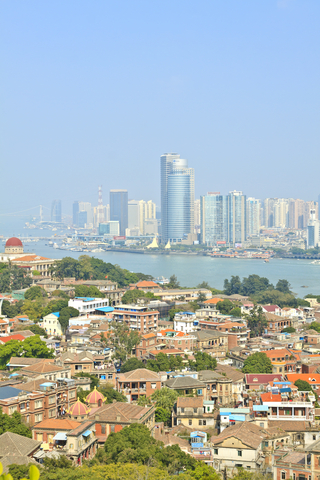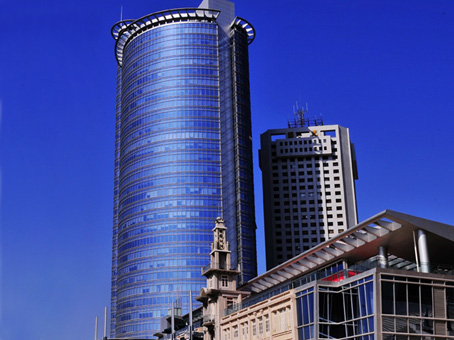
[Updated Oct 2020] A guide to flexible serviced offices and office space to rent in Xiamen as well as general information that may be useful if you are considering renting offices or workspace in the city.
For further Xiamen offices information or to search office space to rent in Xiamen just click. Or contact us for any office space search query.
History & Geography
Located on the south-east coast of China, Xiamen is one of the largest and most important cities in the country. Most of Xiamen is built on Xiamen Island, while the rest is on Gulangyu Island, both of which sit on the mouth of the Jiulong River. The city is part of Fujian Province, which is renowned for its natural beauty. Almost since its inception, Xiamen has functioned as one of China’s most important ports. The city gained in importance in 1387 when the Ming Dynasty built a major fort in the city. Originally the city was named Siming, but the name was changed to Xiamen by the Manchus in the 17th century. Xiamen was captured by the British in the First Opium War in 1841 and became one of the five Chinese ports opened to foreign trade by the Treaty of Nanking. Many of the foreign trading companies were headquartered on the island of Gulangyu and to this day the island is known for its beautiful colonial architecture. During the 19th and early 20th century, many inhabitants of the city emigrated to South East Asia and southern China. As a result, the city’s distinctive dialect and culture became widespread. Later many of the emigrants returned to Xiamen and funded universities and new businesses. Japan occupied the city during WWII from 1938 to 1941. After the war, the city was occupied by the Communists, despite its proximity to Taiwan. In 1980 Xiamen was made a Special Economic Zone as China tried to reform its economy. Due to the foreign investment and trade that this garnered, Xiamen prospered and its population grew. Despite a damaging corruption scandal which surfaced in 1999, the city is still considered a leading business hub by foreign companies and is one of the most economically important cities in China.
Economy
Xiamen generally enjoys a healthy and vibrant economy. The city’s economy is known to be one of the most multifaceted and dynamic in the country and includes fishing shipbuilding, manufacturing, and financial services among its prime industries. Xiamen International Bank is the largest bank in the city and was created as a joint venture between Chinese and foreign investors. Overall more than 600 financial services outfits have a presence in the city. Xiamen has prospered of late from investment from Hong Kong, Taiwan, and the former Portuguese enclave of Macau. To date, almost 400 projects in the city benefit from foreign investment. Xiamen’s per capita GDP was recently found to be USD 9,017, significantly higher than most Chinese cities. Recent economic reforms introduced by the city’s government have further boosted its import and export industry. The city is also known as hosting the annual China International Fair for Investment and Trade, which is a popular gateway for foreign investment in mainland China. Among the drivers of the city’s economy are its industrial zones, the Xiamen Export Processing Zone, the Xiamen Haicang Taiwanese Investment Zone, the Xinglin Taiwan Merchants Development Zone, and Torch Hi-Tech Industrial Development Zone.
Tourism & Culture
Xiamen does not have the tourism industry that cities such as Shanghai and Beijing benefit from, but it does have a unique culture all its own and plays host to many business visitors throughout the year. Among Xiamen’s attractions is the countryside that surrounds the city. In particular, the beaches, often lined with trees, that surround the city. The island of Gulangyu, also known as Piano Island, is a popular retreat for both tourists and residents of the city. The island is famous for its Victorian-era colonial houses as well as its stunning beaches. Xiamen’s most famous landmark is the Nanputuo Temple, which dates back to the Tang Dynasty and is considered a national treasure. Another popular destination in the city is the Water Garden Expo Park, which consists of five man-made islands, two peninsulas, and a spa. Xiamen is also proud of the Xiamen Philharmonic Orchestra, which is generally considered to be one of the best of its kind in China. Xiamen is also known for its distinctive oil paintings and has a range of museums and galleries which exhibit the paintings. The local dialect is Amoy, which the lingua franca of the Fujian Province and is widely spoken outside of China as well.
Transportation
Xiamen is served by the Xiamen Gaoqi International Airport which is one of the busiest airports in China. The airport provides flights to the rest of China, Hong Kong, Taiwan, and Europe. Xiamen Gaoqi International is capable of handling 27 million passengers every year. The city itself is well served by an extensive bus network as well as a rapid transit system. Xiamen also has a large number of taxis, though many residents of the city commute by bicycle. The largest railway station in the city is the Xiamen Railway Station which is connected to the mainland by a bridge.

Because of its proximity to Taiwan, thriving service industries, and a large amount of foreign investment, Xiamen has traditionally had a very healthy office market. The government has forbidden office buildings in residential areas, and as a result office space remains at a premium. The vacancy rate for downtown Class A office space is currently only at about three percent, and this is not forecast to rise. More supply may be had if new industrial parks are built in the suburban areas of the city as has been predicted by some.
There is a growing range of flexible workspace options in Xiamen including co-working space facilities and managed offices, for further information, click the links or contact us.
Our office space search, advisory and acquisition services are FREE, always. We are globally regulated by the Royal Institution of Chartered Surveyors (RICS) ensuring the highest standards of commercial property advice and service at all times.
